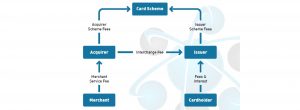What is Interchange and Why Does it Matter?
Even if you have never heard the term ‘interchange’ this article is for you as we look at what it is, why it exists and whether it matters to merchants who accept Card Scheme-branded (Visa, Mastercard and eftpos) payment cards either online, in-store or both.
The payment cards market is ‘two-sided’ with merchants and Acquirers on one side, and with cardholders and Issuers on the other side.

Acquirers provide card-acquiring services to merchants in exchange for a Merchant Service Fee (MSF). Many e-commerce merchants have a Payment Gateway in between themselves and the Acquirer, however in-store merchants usually send card payment transactions directly from their point of sale to their Acquirer. An Acquirer must be an acquiring member of each of the three Card Schemes, which allows them to accept all brands of cards from each of their merchants (American Express has a different model).
On the other side of the market, card Issuers provide unsecured lines of credit to credit cardholders and transaction accounts to debit cardholders. Cardholders pay account or annual fees plus interest on revolving credit balances. Around 63% of outstanding credit card account balances are revolved[1], earning Issuers between 10% and 20% interest depending upon the type of credit card.
Interchange is a fee that is paid from one side of the market to the other. Specifically, it is paid from the Acquirer to the Issuer for each card payment transaction. Issuers generally use this income to finance their cardholder rewards program, designed to incentivise credit cardholders to use their cards more often. The income from Interchange Fees may also be used by Issuers to cover processing costs, fraud costs and other costs. There are a range of different Interchange Fees for different types of cards and for online and offline transactions.
Acquirers pass the cost of interchange on to their merchants, included as a cost component of the Merchant Service Fee.
Why is this significant to merchants?
The Acquirer receives the MSF from the merchant, and then pays the interchange fee to the relevant card Issuer (unless the Acquirer happens to be the Issuer as well – known as an On-Us Transaction). Therefore, for most card payment transactions, the Acquirer earns the MSF less the cost of interchange. For this reason, the Interchange Fee places a cost floor underneath the MSF, making it impossible for the merchant to negotiate a MSF rate below the interchange fee. Therefore, it is important to know what these Interchange Fees are before conducting a price negotiation with an Acquirer.
It is also important to understand what the level of Interchange Fees are, in order to make a realistic estimate of the amount of margin being earned from the merchant by the Acquirer. Some merchants are unwittingly paying high margins to their Acquirers because they are unaware of how interchange operates and at what rates.
The level of Interchange Fees is regulated by the Payments System Board of the Reserve Bank of Australia (RBA). Credit card interchange is set at an ad valorem (percentage) rate, while debit card interchange is set at a fixed cents per transaction rate. While the credit and debit rates of interchange are very different, many merchants are paying a single ‘blended’ rate for all their Visa and Mastercard credit and debit transactions which often means they are paying too much for their debit payments.
Part of the regulatory requirements for interchange specifies that these rates must be available in the public domain where merchants can see them. Current Interchange Fees for each of the schemes can be found at:
- Visa – https://www.visa.com.au/about-visa/interchange.html
- Mastercard – https://www.mastercard.com.au/en-au/about-mastercard/what-we-do/interchange.html
- eftpos – https://www.eftposaustralia.com.au/interchange-fees-and-principles
For definitions of the key terms (capitalised words) used in this article, please refer to the Merchant Advisory Glossary.
Author: Robert Roylance, Associate, Australia, Payments Consulting Network
***
If you found this article helpful and would be interested in reading similar articles by our consulting team, please subscribe to our newsletter.
Are you interested in reading articles on a particular payments topic, company, payments industry executive or author? Click the search icon, it’s that magnifying glass in the top righthand side of the website, and type in the key words that interest you. You will then be presented with a list of any articles that match your search criteria.
***
To find out more about how Payments Consulting Network can assist, please refer to the Services section. To read recent client testimonials, please refer to the Case Studies section as these highlight the difference engaging Payments Consulting Network can make.
If you would like support with running a request for proposal process or card scheme strategic merchant rate negotiations, then contact Payments Consulting Network to schedule a call.